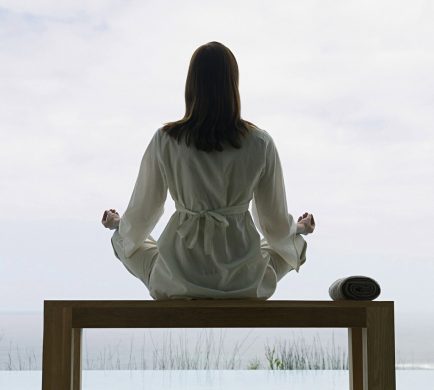We all want to experience joy, happiness, and fulfillment. Yet, it’s not uncommon to feel lost, overwhelmed, and disconnected from ourselves. We have stories that fill our minds with negative thoughts, leading to self-doubt, fear, anxiety, and depression. It’s no wonder that we often seek
external validation and distractions to numb our pain or escape reality. But the truth is, we cannot rely on others to fill the void within us. We need to learn how to cultivate inner peace and self-love, no matter the challenges.
1. Cultivate self-awareness
Self-awareness, the capacity to understand and monitor our internal world, including our thoughts, emotions, values, and motivations, is the first step towards inner peace. This is not about changing who we are but rather understanding the authentic nature of our soul.
One tool to achieve this is through mindfulness meditation. This involves paying attention to the present moment, focusing on your breath, and calmly observing your thoughts and feelings without judgment. With practice, meditation can help you become more aware of your thoughts and emotions and identify any limiting beliefs or negative self-talk.
Another way to cultivate self-awareness is journaling, which can help you reflect on your experiences, emotions, and thoughts. By putting your thoughts and feelings on paper, you can develop a deeper understanding of yourself and your emotions. This process can help you become more aware of your thoughts and allow you to make more intentional choices that align with your values and goals.
Identifying your values can also help you develop self-awareness. Living in alignment with our values can bring meaning and purpose to our lives. Take some time to identify what matters most to you, what makes you happy, and what you want to achieve in life. Use your values as a guidepost when making decisions, and be conscious of when your actions and behaviors may be out of alignment with your values. By living in alignment with our values, we can experience greater fulfillment and happiness.
2. Practice self-compassion
Self-love can be a difficult concept to grasp. We often think of it as doing that which feels good at the moment, but in reality, self-love goes much deeper than that. It’s about treating ourselves with kindness and empathy, especially when we’re feeling down or overwhelmed. The key to cultivating self-love is through self-compassion and becoming aware of how we talk with ourselves.
First, speak to yourself as you would to a friend. Imagine your best friend was going through a tough time – what would you say to them? Apply this same kindness and understanding to yourself. Whenever you feel overwhelmed or upset, practice speaking to yourself in a gentle, supportive voice. By doing this, you’ll start to rewire your brain and develop a more positive relationship with yourself.
Second, it’s important to acknowledge your strengths and achievements. Many of us are quick to dismiss our accomplishments or downplay them as insignificant. However, by doing so, we’re harming our own self-worth. Take a moment to reflect on your recent achievements. Acknowledge these wins and give yourself credit. By doing this, you’ll start to recognize your own worth and realize that your capacity you have to be limitless.
It is important to note that self-compassion is not a one-time thing. It requires consistent effort and practice. You won’t wake up one day and suddenly be a pro at self-compassion. It’s a process that takes time and patience. So, be gentle with yourself as you navigate this journey. Recognize that there will be setbacks and challenges, but as long as you’re making an effort to be kind to yourself, you’re on the right track.
Self-love is more than the occasional bubble bath or massage. It’s about treating ourselves with empathy and kindness, even when we’re at our lowest. By practicing self-compassion, we’re able to build resilience, develop a positive relationship with ourselves, and recognize our own worth. Remember, this is a journey that takes time and patience. Be gentle with yourself and know that every effort you make towards practicing self-compassion is a step towards cultivating true self-love.
3. Set healthy boundaries
We live in a society that constantly demands our attention and energy. It can be difficult to carve out time for ourselves and prioritize our needs. As a result, we often find ourselves feeling drained, overwhelmed, and disconnected from our inner selves. One of the most important skills to cultivate inner peace and self-love is the art of saying “no” and setting boundaries, which can lead to a more fulfilling and balanced life.
Learning to say “no” is akin to creating a protective shield that shields your energy from being drained by others. When we say “yes” to everything, we risk burning out and neglecting our self-care needs. Setting boundaries means being selective about how and where we spend our energy and time.
Saying “no” also helps us respect our values and beliefs. If someone asks you to do something that goes against your values or makes you feel uncomfortable, it’s important to set a boundary and say “no .”Valuing our beliefs also means valuing our self-worth, and saying “no” can help us develop a stronger sense of self.
Healthy relationships are built on a foundation of mutual respect and consideration for each other’s needs. Setting boundaries ensures that we are clear about our expectations and that we hold ourselves and others accountable. Healthy relationships should never make us feel guilty or ashamed, and saying “no” is a powerful tool to ensure that we maintain our boundaries.
Finding inner peace and self-love is not a destination but a continuous journey of self-discovery, healing, and growth. It’s about making a conscious choice to prioritize your mental, emotional, and physical well-being and developing a deeper connection with your true self. Remember, you are worthy of love, acceptance, and happiness, and you have the power within you to create the life you desire. By cultivating self-awareness, practicing self-compassion, setting healthy boundaries, choosing self-growth, and seeking support, you can start your
journey toward inner peace and self-love today.
One of the most important aspects of setting boundaries is prioritizing our self-care rituals. This can include taking breaks when we need them, practicing self-care activities, and avoiding activities that make us feel stressed or anxious. By saying “no” to activities that do not support our well-being, we prioritize our health and create space for more fulfilling experiences in our lives.
Learning to say “no” can be challenging, especially if we have a habit of putting others’ needs ahead of our own. However, by setting boundaries and prioritizing our needs, we build a sense of inner peace and self-love. When we respect ourselves, we attract others who will respect and value us as well. By cultivating this inner peace and self-love, we open ourselves up to a more fulfilling and satisfying life.
Learning to say “no” and setting boundaries is crucial for cultivating inner peace and self-love. By protecting our energy, respecting our values, maintaining healthy relationships, prioritizing self-care, and building inner peace, we create a more fulfilling and balanced life. Saying “no” may not always be easy, but it is a powerful tool for creating the life we deserve. We deserve to prioritize our needs and create boundaries that serve our well-being.







